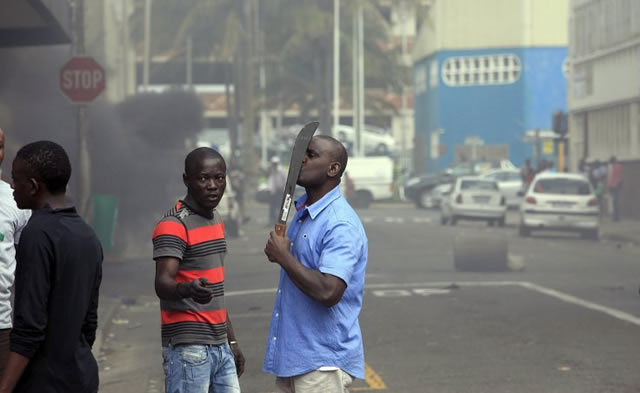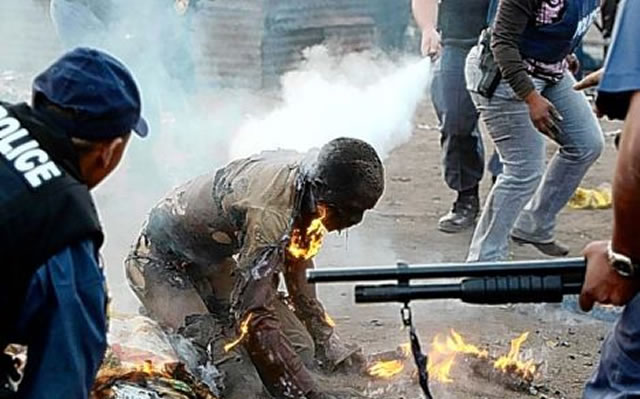Cecil John Rhodes fell, xenophobia must follow

 Christopher Farai Charamba
Christopher Farai Charamba
Cecil John Rhodes has fallen at the University of Cape Town but South Africa still has a long way to go.
The protest against the Rhodes statue at UCT, started by student Chumani Maxwele over a month ago, came to an end when the university brought the statue down last Thursday.
For the students protesting against institutional discrimination at UCT, it was a big win and has furthered the debate into monuments and statues in public spaces.
Around South Africa and at other institutions the world over questions are being asked about various memorials and cenotaphs that honour individuals of questionable morals and belong to certain historical eons and establishments.
This win for UCT is a win for the country and the continent.
In the countless debates some have dismissed what it means for the Rhodes statue to be removed citing that it is trying to erase history or rewrite it.
One finds such opinion greatly misinformed and misguided. What has happened here is not erasing history but creating it.
It is about reclaiming the narrative that has been held in foreign hands since the first European settlers came to the continent.
History will talk of Chumani Maxwele and his unconventional protest and why it was necessary for such action to be taken.
It will examine Rhodes in full not only as the mining magnate with a grand Cape to Cairo vision but as a racist, a murder and a pillager.
It is important for us Africans to control the narrative of our history.
There was a time when the global opinion was that Africans had no history and thus what became of it was the opinion of those that saw our forefathers but did not live their lives.
The step to reclaim public spaces is not trivial as some might suggest because it gives light to what is important to a people. Public spaces form part of the identity of a people particularly in a nation state and individuals celebrated in those spaces guide the narrative of the history and of the future.
And so Rhodes had to fall and perhaps Kruger, too. If South Africa believes in what they call a ‘Ranbow Nation’ then all remnants of the colonial and apartheid era should be removed in order for public spaces to reflect the identity of what all the people stand for and believe in.
But that does not mean that the history of colonialism and apartheid should be erased.
As George Santayana said, “Those who cannot remember the past are condemned to repeat it.”
A space should be created akin to the Holocaust museums for example that remember the atrocities that took place without celebrating the individuals that carried them out.
There is a lot of work that goes into building a nation especially one with a diverse history and culture.
Accommodating different peoples, opinions, histories and cultures is difficult but extremely important.
South Africa has tried to do this, Mandela paved the way, the Truth and Reconciliation Commissions playing an instrumental role in that.
The vision of the ‘Rainbow Nation’ was admirable and believable.
It is therefore disturbing that while some are fighting against institutional discrimination and the reclaiming of public spaces, others are committing violent acts against foreigners in South Africa.
Xenophobia has taken centre stage again South Africa as foreigners are suffering attacks against their lives and properties.
The situation has also been worsened by statements made by Zulu King Goodwill Zwelithini and Edward Zuma against foreigners.
There is an irony here, on the one hand there are South Africans who are fighting against oppressive symbols of an era past where their rights and beings were violated.
On the other hand there are South Africans committing similar acts for similar reasons to those used against them.
Now one should certainly not generalise and say that all South Africans are xenophobic but for us to avoid making sweeping claims then South Africans must denounce xenophobia with the same fervour that the students at UCT took up the #RhodesMustFall movement.
The movement went viral internationally and although the nucleus of the issue was at UCT it has become a national topic. Xenophobia needs the same attention. It is critical that all South Africans are seen to fight against the minority committing such horrific acts.
Should this not happen then a stereotype will form that South Africans are xenophobic. The image of the nation can fast be tarnished by a few people. The South African government should also be shown to protect foreigners within their borders.
Visible action such as perpetrators being arrested and convicted for their crimes should take place. The recent deployment of Ministers to Kwazulu-Natal by President Zuma is definitely a step in the right direction but a strong message needs to be sent to those committing such acts.
History tells us that African immigrants have long played an influential part in South Africa.
From as early as AD 300 when the first set of Bantu migrants settled in what is now the Kwazulu-Natal area.
The blood, sweat and tears of migrant workers from all over Southern Africa some as far as Malawi, Angola and Tanzania who were exploited by the likes of Rhodes during the late 19th Century mining revolution.
A few months ago this writer wrote on the importance of history and no more so is it evident than now. In the attempts to reclaim public spaces as well as their historical narrative South Africans should include and discuss the importance and roles that foreign nationals played in the history of the country.
Perhaps this could change the narrative from what it is today and open the consciousness of all South Africans in the hope that it contributes towards stemming xenophobia. As Rhodes fell last week the onus is now on the people of South Africa to ensure xenophobia follows suit.







Comments